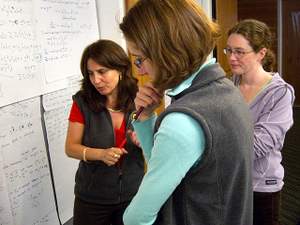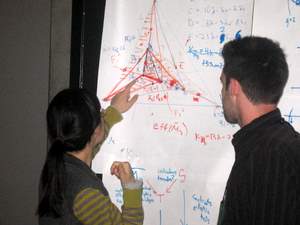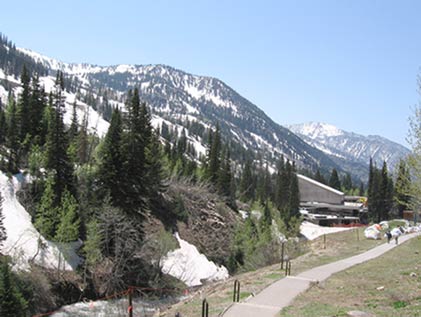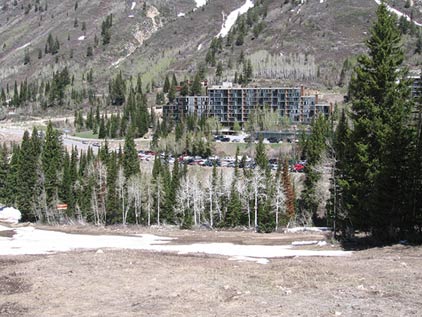Mathematics Research Communities - 2013
The American Mathematical Society (AMS) invites mathematicians just beginning their research careers—those who are close to finishing their doctorates or have recently finished— to become part of Mathematics Research Communities, a unique and successful program that builds social and collaborative networks to inspire and sustain each other in their work. Women and underrepresented minorities are especially encouraged to participate. The structured program engages and guides all participants as they start their careers.
"It was empowering and created a more lasting learning experience because participants created their own knowledge based on the well-organized background, building blocks, and current research ideas presented by the conference organizers. Great conference!" --- MRC 2011 participant
The program includes:
-
One-week summer conference for each topic (With the exception of week 3, participants arrive on Sunday and depart the following Saturday; sessions are held Monday through Friday. For week 3, participants arrive on Tuesday and depart the following Monday; sessions are held Wednesday through Sunday.)
-
Special Sessions at the national meeting
-
Discussion networks by research topic
-
Longitudinal study of early career mathematicians
Those accepted into this program will receive support (full room and board at Snowbird and up to US$649 in air transportation) for the summer conference, and will be partially supported for their participation in the Joint Mathematics Meetings which follow in January 2014. The summer conferences of the MRC are held in the breathtaking mountain setting of the Snowbird Resort, Utah, where participants can enjoy the natural beauty and a collegial atmosphere. This program is supported by a grant from the National Science Foundation.
Week 1a: June 9 – 15, 2013 - Complex Dynamics
Organizers:
Laura DeMarco, University of Illinois at Chicago
Adam Epstein, University of Warwick
Sarah Koch, Harvard University
The Mandelbrot set is one of the most famous objects in modern mathematics. The goal of this MRC is to engage participants in the active, central research surrounding the Mandelbrot set and related objects. We expect our participants to be already familiar with the fundamentals of holomorphic dynamics (at the level of the introductory book Dynamics in One Complex Variable by John Milnor). The emphasis of the week's activities is on experimentation and discovery. We will make use of existing computer programs for drawing bifurcation loci and Julia sets.
We will explore the moduli spaces of rational maps; in each given degree, this is the space of all rational functions of that degree, modulo the conjugation action by Möbius transformations. We will employ multiple points of view: dynamical (in terms of stability and bifurcations and combinatorial models), algebraic (in terms of global algebro-geometric structure and underlying arithmetic principles), and geometric (via metric structures on dynamically distinguished subsets). A description of the moduli spaces, together with a survey of interesting results and questions with an arithmetic flavor, can be found in the new monograph Moduli Spaces and Arithmetic Dynamics by Silverman. Specific topics we might explore include: (1) The topological or analytic structure of hyperbolic components and their closures in the moduli space; (2) Structure of and coincidences among the distinguished algebraic hypersurfaces in the moduli space, describing the locus of maps with an n-cycle of given multiplier; (3) Thurston's topological characterization of rational maps and the associated pull-back map on Teichmüller space; (5) The mating locus and "magic formulas" illustrating mating discontinuities.
More details can be found on DeMarco's webpage at http://homepages.math.uic.edu/~demarco/.
Week 1b: June 9 – 15, 2013 - Tropical and Nonarchimedean Analytic Geometry
Organizers:
Matt Baker, Georgia Institute of Technology
Sam Payne, Yale University
Tropical geometry uses a combination of techniques from toric geometry, Groebner theory, combinatorics, and rigid analysis to study algebraic varieties over valued fields.
This workshop will focus on links between tropical and nonarchimedean analytic geometry, and potential applications in algebraic geometry and number theory. We will introduce the fundamental objects and techniques, including extended tropicalizations for subvarieties of toric varieties; Groebner theory and initial degenerations; polytopal domains and their canonical reductions; Berkovich's theory of nonarchimedean analytic spaces; nonarchimedean uniformization of curves and abelian varieties; and linear series on tropical curves. We will also discuss how all of these tools can be applied to the classical theory of algebraic curves and their Jacobians.
The field is relatively new, so participants will have the opportunity to review the standard background in tropical geometry and also get a glimpse of the cutting edge in this active research area through individual and collaborative work on open problems of current interest.
Week 2: June 16 – 22, 2013 - Geometric Group Theory
Organizers:
Ruth Charney, Brandeis University
Tullia Dymarz, University of Wisconsin, Madison
Dan Margalit, Georgia Institute of Technology
Kim Ruane, Tufts University
Kevin Wortman, University of Utah
Geometric group theory is a large and growing field. One of the goals of this MRC program will be to introduce young researchers to a variety of current topics in geometric group theory. Mini-courses will present basic results and techniques from the theory of CAT(0) cube complexes, hyperbolic groups, and their boundaries; mapping class groups and pseudo-Anosov homeomorphisms of surfaces; and cohomology of arithmetic groups.
Another important goal of the program will be to aid the participants in creating new and interesting open problems in geometric group theory. Participants will work in groups to identify open problems of interest to them, and to begin collaborations that will continue beyond the program.
In the evenings, discussions will be held on topics of professional development, including presenting research talks, obtaining tenure, and teaching effectively.
Week 3: June 25 - July 1, 2013 - Regularity Problems for Nonlinear Partial Differential Equations Modeling Fluids and Complex Fluids
Organizers:
Peter Constantin, Princeton University
Gautam Iyer, Carnegie Mellon University
Igor Kukavica, University of Southern California
Helena Nussenzveig-Lopes, Universidade Federal do Rio de Janeiro
Jiahong Wu, Oklahoma State University
This MRC conference focuses on several outstanding systems of partial differential equations modeling fluids and complex fluids: the Euler equations, the Navier-Stokes equations, the primitive equations of oceanic and atmospheric dynamics, the surface quasi-geostrophic equations, the Boussinesq equations, and the Smoluchowski equation of complex materials and polymeric flows.
These partial differential equations have been at the center of numerous analytical, experimental, and numerical investigations in recent years. One of the most fundamental problems concerning these partial differential equations is whether their classical solutions are globally regular for all time or they develop singularities. Even though the existence and regularity problems can be extremely challenging, intensive effort has led to very exciting and new developments for these important systems.
This MRC conference intends to achieve four goals:
-
Bring together young mathematicians (advanced Ph.D. students and recent postdocs) with closely-related research interests in order to make connections and foster interactions and collaboration.
-
Introduce the participants to the state-of-the-art research on the main themes of this conference and get them acquainted with the essential techniques.
-
Give participants the opportunity to work on a few actively investigated open problems.
-
Provide the participants with concrete guidance on proposal-writing, searching for jobs, and other key issues in their professional development.
Application Procedure
Individuals within one to two years prior to the receipt of their PhDs, or within one to three years after receipt of their PhDs are welcome to apply. The MRC program is open to individuals who are U.S. citizens as well as to those who are affiliated with U.S. institutions. A few international participants may be accepted. An exception to the limit on the mathematical age of an applicant may be made on a case-by-case basis. Women and underrepresented minorities are especially encouraged to apply.
All participants are expected to be active in the full MRC program. Please note that there is a generic cover sheet to submit. However, submitting this cover sheet does not constitute an application. You must answer an additional set of questions and submit this as well. In addition to the completed application form (cover sheet and additional questions), you must submit a letter of reference from a mathematician who can discuss how you will benefit and how you will contribute by participating in the MRC program. Instructions are as follows:
-
Login to MathPrograms.Org as a Program applicant (click on “as Program applicant”).
-
To create an account, fill in your email address, create a password, click the button “this is my first login, please create an account for me”, then click the “login” button. A login token will be sent to the email address provided. Please check your email.
-
Once you have received the token, enter it in the text box on the screen, or come back to www.mathprograms.org within 24 hours and click on the applicant login link to continue.
-
Once you are logged in, fill in the cover sheet and submit it. Name your reference writer and make sure the email button is on so the writer will receive automatic notification.
-
Click on “View Programs” and then click on “apply” next to the program you want and complete the questions.
-
Follow the directions from there.
You can log in to the MathPrograms system at a later date to update your application and/or to verify that the reference letter has been submitted. The application is complete when all questions have been answered and the reference letter has been received. Deadline for receipt of applications is March 1, 2013.
Top of Page
Snowbird
Situated in a beautiful, breathtaking mountain setting, Snowbird Resort provides an extraordinary environment for the MRC. The atmosphere is comparable to the collegial gatherings at Oberwolfach and other conferences that combine peaceful natural ambience with stimulating meetings. MRC participants have access to a range of activities such as a tram ride to the top of the mountain, guided hikes, swimming, mountain bike tours, rock climbing, plus heated outdoor pools. More than a dozen walking and hiking trails head deep in the surrounding mountains. Participants also enjoy the simpler pleasures of convening on the patios at the resort to read, work, and socialize. In the evenings colleagues enjoy informal gatherings to network and continue discussion of the day's sessions over refreshments. Within a half hour of the University of Utah, Snowbird is easily accessible from the Salt Lake City International Airport. For more information about Snowbird Resort, see www.snowbird.com.
For further information, please contact
Ellen J. Maycock at
ejm@ams.org.
Top of Page






